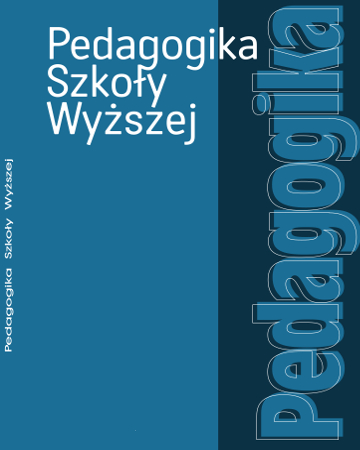
ISSN: 2083-4381
OAI
DOI: 10.18276/psw.2015.2-07


Issue archive /
2/2015
Inteligencja społeczna nauczycieli akademickich a ich ukryte teorie na temat osobowości studentek/studentów
(Social intelligence of university teachers and their secret theories on students personalities)
| Authors: |
Janusz
Ślusarski
Wyższa Szkoła Oficerska Sił Powietrznych |
| Keywords: | social intelligence secret theories teacher student |
| Data publikacji całości: | 2015 |
| Page range: | 14 (131-144) |
Abstract
In the article, the author focused on problems of dependence between social intelligence of university teachers and secret theories on students personalities formulated by them. In relations a teacher-student, like in other interpersonal contacts, participants experience reciprocal similarities and differences in the range of their opinions, evaluations, attitudes and feelings. An essential factor that decides about relation between a teacher-student is, among others, level of social intelligence of a teacher. The intelligence enables him/her better knowledge of students as well as their more accurate and full evaluation. Taking that into consideration, an examination in one hundred-group of university teachers was conducted. It aimed to check the hypothesis that university teachers of higher social intelligence, notice their students better and their students’ secret theories on students personalities are more accurate.
Download file
Article file
Bibliography
| 1. | Asch S.E., Forming Impressions of Personality, „Journal of Abnormal and Social Psychology” 1946, no. 41. |
| 2. | Bonino S., Empatia a inteligencja, cechy osobowości i temperamentu, „Psychologia Wychowawcza” 1994, nr 5. |
| 3. | Goleman D., Inteligencja społeczna, tłum. A. Jankowski, Rebis, Poznań 2007. |
| 4. | Mlicki P., Decentracja interpersonalna jako przedmiot badań psychologicznych, „Psychologia Wychowawcza” 1989, nr 30, s. 403–414. |
| 5. | Matczak A., Diagnoza intelektu, Wyd. PAN, Warszawa 1994. |
| 6. | Janowski A., Uczeń w teatrze życia szkolnego, WSiP, Warszawa 1995; A. Gurycka, Błąd w wychowaniu, WSiP, Warszawa 1990. |
| 7. | Kliś M., Kossewska J., Empatia a inteligencja, cechy osobowości i temperamentu, „Psychologia Wychowawcza” 1994, nr 5. |
| 8. | Lewicki P., Zjawisko ukrytej teorii osobowości w procesie spostrzegania społecznego, w: Psychologia spostrzegania społecznego, red. M. Lewicka, Książka i Wiedza, Warszawa 1985. |
| 9. | Matczak A., Jaworowska A., Szustrowa T., A. Ciechanowicz, Bateria Testów APIS-Z. Podręcznik, Pracownia Testów Psychologicznych PTP, Warszawa 1995. |
| 10. | Kranas G., Wybrane zagadnienia społecznej psychologii organizacji, t. II, Wyd. UW, Warszawa 1991. |
| 11. | Sillamy M., Słownik psychologii, tłum. K. Jarosz, Książnica, Warszawa 1994. |
| 12. | Piotrowska A., Techniki pomiaru inteligencji społecznej, „Psychologia Wychowawcza” 1993, nr 4; eadem, Pomiar inteligencji społecznej w psychologii osobowości i w psychologii społecznej, „Psychologia Wychowawcza” 1994, nr 2. |
| 13. | Tokarski S., Kierowanie ludźmi, Wyd. BWSH, Koszalin 1998. |
| 14. | Węgliński A., Opracowanie Kwestionariusza Rozumienia Empatycznego innych ludzi (KRE), „Wzorce Psychologiczne” 1983, nr 4. |